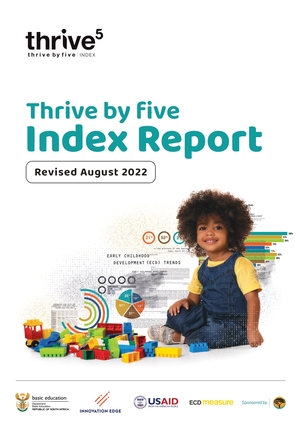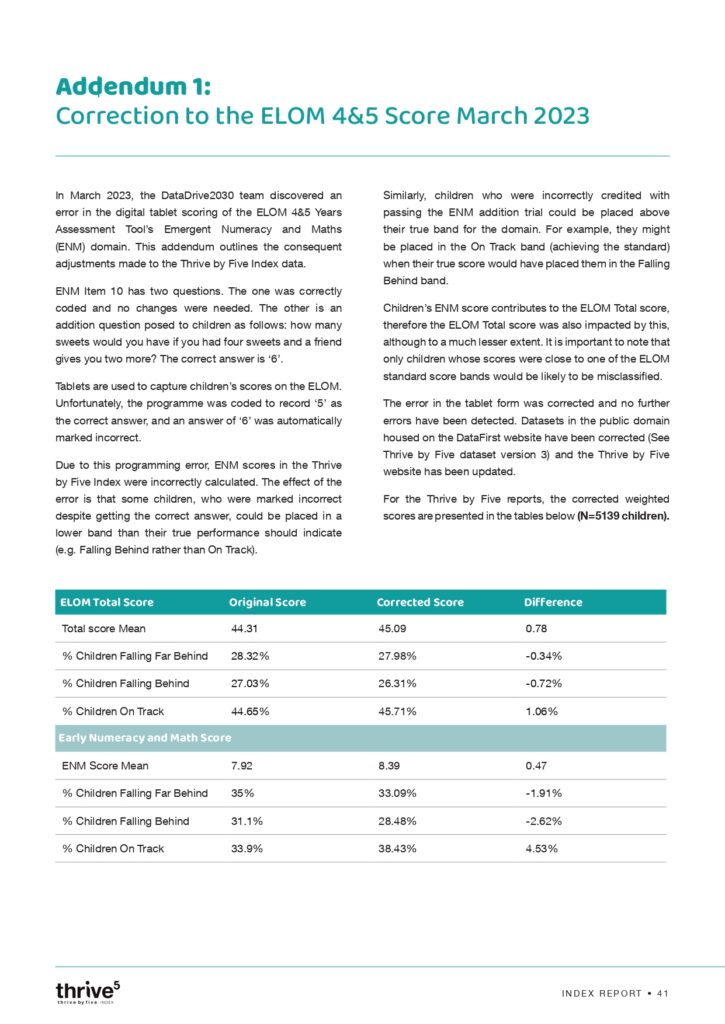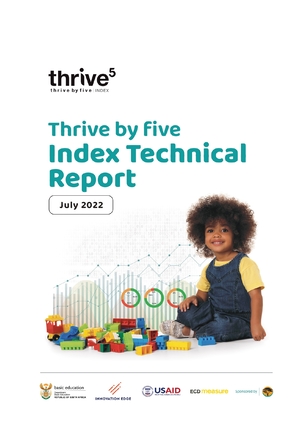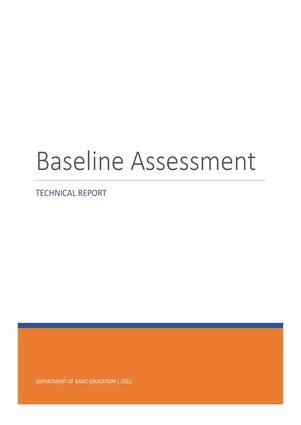The 2021 Thrive by Five Data
Join us in using data to drive change
What percentage of 4 to 5-year-old children in Early Learning Programmes in South Africa are thriving?
2021 National Level Findings
Explore the 2021 Thrive by Five Index data at a national level by selecting a development indicator. Filter further by sex, provinces, and income.
Learning Total
These developmental domains are important individually, and they are also interdependent. The items included in the ELOM 4&5 tool assess the abilities and knowledge that are important for children as they transition into Grade R and the skills known to be associated with academic achievement in the Foundation Phase (Grades 1, 2 and 3).
Gross Motor Development is particularly important in the transition to Grade R. Motor development has also been found to have a social and emotional benefit in the primary phase of schooling as motor competence facilitates peer engagement through participation in games, and is associated with emotional well-being as well as with academic achievement
Fine motor skills and visual-motor integration are important for coordinating the use of the hands and the eyes. These skills help children, for example, to copy shapes and learn to form letters correctly. Visual-motor integration skills in five-year olds also make a specific contribution to early mathematics, most likely because they influence the child’s ability to manipulate objects
Early mathematics skills are strongly predictive of later school success. Good math foundations, such as counting and being able to identify numbers and patterns, are essential for a deeper understanding of more complex mathematical concepts and problem-solving.
Executive function skills help children hold information or instructions in mind during classroom activities, focus on task-relevant stimuli during problem-solving tasks, and resist distraction. Having good CEF skills means that children are able to engage and participate more in classroom activities which leads to better learning outcomes. CEF skills are also associated with mathematics skills in 5-6-year-old children
Emergent Literacy and Language skills are important for communicating effectively. Being able to understand what is being said and read by a teacher and being able to communicate effectively through speech and writing are all essential for school success. Those children who have the opportunity and support to start reading early have a clear advantage as early reading ability is the most powerful predictor of reading ability in middle childhood. Early language abilities will affect a child’s understanding of the instructions that must be followed when they are given any task, influencing their learning in other areas such as early math.
Stunting is a chronic (long-term) condition that is a reflection of the overall poor health status of the child and usually results from chronic malnutrition. Growth stunting is known to compromise neurological and cognitive development with significant loss of an individual’s potential. The effects of early stunting depend on the child’s age and the duration of deprivation but can persist throughout childhood and adolescence, compromising the child’s ability to learn in school and eventually impacting their life opportunities.
Social and emotional wellbeing is important for school readiness and overall performance in primary school. Children with better social and emotional functioning tend to transition more successfully into the school environment, and these skills influence the child’s ability to play and work with their peers in a group setting, to ask for information or help from a teacher, to complete tasks independently, and to handle change.
Social and emotional wellbeing is important for school readiness and overall performance in primary school. Children with better social and emotional functioning tend to transition more successfully into the school environment, and these skills influence the child’s ability to play and work with their peers in a group setting, to ask for information or help from a teacher, to complete tasks independently, and to handle change.
2021 Provincial Level Findings
Explore the 2021 Thrive by Five Index data at a provincial level by clicking on a province in the map below.
Number of children aged 0-5
< 200,000 | 200,000 - 500,000 | 500,000 - 1,000,000 | 1,000,000 - 1,500,000 | > 1,500,000
Western Cape
711,000 children aged 4-5 years (GHS2019)
27% children aged 4-5 years live in poverty (GHS2019)
559 children were assessed as part of the Thrive by Five data collection
Eastern Cape
839,000 children aged 4-5 years (GHS2019)
77% children aged 4-5 years live in poverty (GHS2019)
587 children were assessed as part of the Thrive by Five data collection
Free State
332,000 children aged 4-5 years (GHS2019)
61% children aged 4-5 years live in poverty (GHS2019)
565 children were assessed as part of the Thrive by Five data collection
North West
512,000children aged 4-5 years (GHS2019)
64% children aged 4-5 years live in poverty (GHS2019)
564 children were assessed as part of the Thrive by Five data collection
Northern Cape
158,000 children aged 4-5 years (GHS2019)
51% children aged 4-5 years live in poverty (GHS2019)
600 children were assessed as part of the Thrive by Five data collection
Mpumalanga
593,000 children aged 4-5 years (GHS2019)
66% children aged 4-5 years live in poverty (GHS2019)
540 children were assessed as part of the Thrive by Five data collection
Limpopo
885,000 children aged 4-5 years (GHS2019)
72% children aged 4-5 years live in poverty (GHS2019)
578 children were assessed as part of the Thrive by Five data collection
Kwazulu-Natal
1,418,000 children aged 4-5 years (GHS2019)
63% children aged 4-5 years live in poverty (GHS2019)
575 children were assessed as part of the Thrive by Five data collection
Gauteng
1,575,000 children aged 4-5 years (GHS2019)
34% children aged 4-5 years live in poverty (GHS2019)
571 children were assessed as part of the Thrive by Five data collection
Publications
About the 2021 Dataset
The information presented here and in the reports is representative of the population of 4-5-year-old children attending Early Learning Programmes (ELP) in South Africa. There are 1.2 million children in South Africa aged 4-5 years; 45%-55% of them are reported to attend some kind of ELP.
The 2021 Thrive by Five Index involved a random sample of over 5,000 children aged 50-59 months enrolled in 1,247 ELPs across the country. For every child, we assessed key areas of development that are important for success in school: Early Learning, Physical Growth and Social-Emotional Functioning. For each of these areas of development, the Thrive by FIve Index reports the proportion of children who meet the expected standard for their age.
The 2021 Index also includes one combined composite indicator on the proportion of children who are on track for both physical and cognitive development by age 4-5 years.
Full 2021 Data Set
The full anonymised 2021 Thrive by Five Index dataset is available on the University of Cape Town DataFirst open data portal.
Suggested Citation
Giese S2, Dawes A3, Tredoux C4, Mattes F5, Bridgman G6, van der Berg S7, Schenk J8 and Kotzé J9 (2022) Thrive by Five Index Report Revised August 2022, Innovation Edge, Cape Town. www.thrivebyfive.co.za





